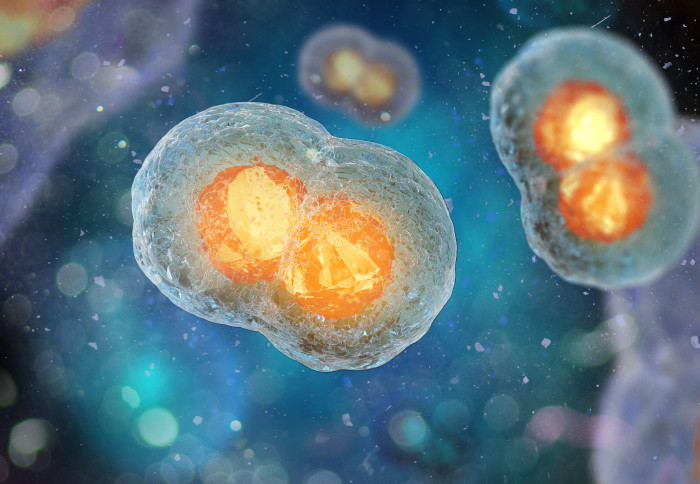Cell division and quantum leadership: News from the College

Here’s a batch of fresh news and announcements from across Imperial.
From research into the factors that affect how long it takes cells to divide, to a prestigious award for one of Imperial’s physicists, here is some quick-read news from across the College.
Cell division

What controls how long it takes for cells to complete a round of division? In part, this is controlled by factors in the cells that can be inherited across generations of cells. To tease out these factors, researchers in the Department of Mathematics and the MRC London Institute of Medical Sciences at Imperial have studied single cell divisions for bacterial, mammal, and cancer cells.
By combining time-lapse data with modelling, they were able to show that several division patterns stem from circadian rhythms – the day-night cycles that control many processes in our bodies – and that the pattern may be different in cancer compared to healthy mammal cells.
The study also changes the way researchers find patterns in noise, using single-cell genealogies rather than looking at distributions. The research, at the intersection of maths and medicine, was enabled through the EPSRC Centre for Precision Healthcare with PhD student Fern Hughes as first author.
Read the full paper in eLife.
Survival of the densest

When a species outcompetes another, it is often assumed that either individuals of the winning species replicate/reproduce more frequently, or individuals of the losing species die more frequently. This idea sometimes results in a grim picture of ‘competition for survival’ and has contributed to the association of evolutionary theory with social Darwinism and eugenics.
Now, researchers in the Department of Mathematics have introduced a model predicting that a species can win because it consumes less resources and can live at higher densities in the system. The mechanism, driven by noise, has been called ‘stochastic survival of the densest’. The researchers successfully applied the model to a phenomenon thought responsible for the ageing of muscles.
Interestingly, a species that consumes less resources can be seen as altruistic. Therefore, the model can also account for the spread of altruism: when a species wins a competition, it might be because it is altruistic.
Read the full paper in Proceedings of the National Academy of Sciences.
Quantum leadership
 Professor Sir Peter Knight, from the Department of Physics, has been awarded the Institute of Physics President’s Medal for services to physics and quantum leadership. Professor Knight receives the Institute’s most prestigious award for his leadership and championing of the value of physics and quantum technology to society, nationally and internationally.
Professor Sir Peter Knight, from the Department of Physics, has been awarded the Institute of Physics President’s Medal for services to physics and quantum leadership. Professor Knight receives the Institute’s most prestigious award for his leadership and championing of the value of physics and quantum technology to society, nationally and internationally.
Professor Knight has been at Imperial since 1979. His leadership has been pivotal in the conception and development of the UK National Quantum Technology Program (NQTP). From the start of the NQTP in 2014, to its ongoing program today, the NQTP is a beacon of excellence internationally in how forefront research in physics can be translated into benefit for society.
He was presented with the medal by IOP President Professor Sheila Rowan CBE, who said: “Sir Peter’s contributions across a wide range of disciplines have supported strategically crucial areas in both defence and the development of new quantum technologies and he also served with distinction as the President of the IOP.”
Read more on the Institute of Physics website.
Main image credit: Shutterstock. Want to be kept up to date on news at Imperial? Sign up for our free quick-read daily e-newsletter, Imperial Today.
Want to be kept up to date on news at Imperial? Sign up for our free quick-read daily e-newsletter, Imperial Today.
Article text (excluding photos or graphics) © Imperial College London.
Photos and graphics subject to third party copyright used with permission or © Imperial College London.
Reporter
Hayley Dunning
Communications Division